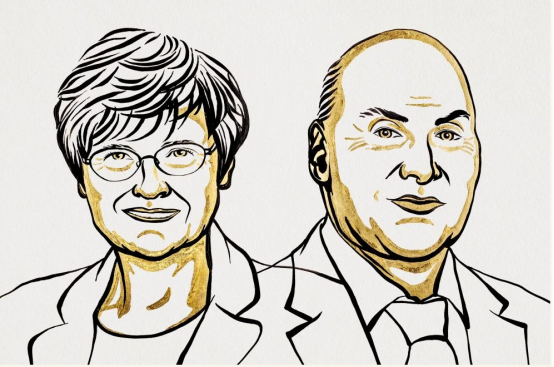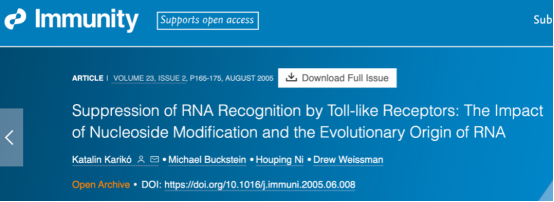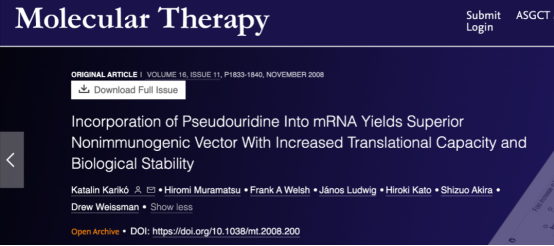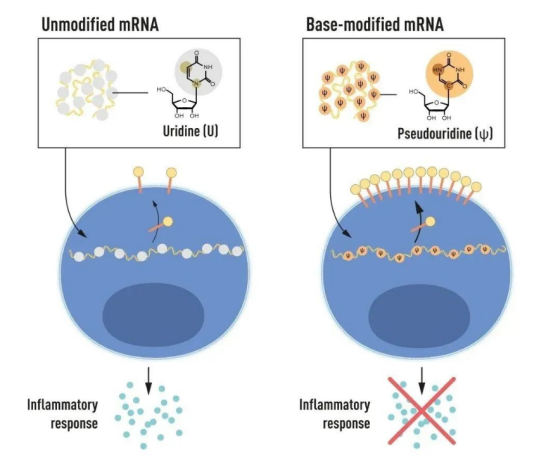Please click the button below to go to our email login page
|
The Big Reveal: Why They Can Win 2023 Nobel Prize in Physiology or Medicine?The 2023 Nobel Prize in Physiology or Medicine was announced on October 2,
2023. The American scientists Drew Weissman and Katalin Karikó have been named
winners of the Prize for “discovering nucleotide base modification and thus
developing effective mRNA vaccines against COVID-19”.
In the 1990s, Weissman put most of his energies into research of dendritic cells, which are pivotal to initiate the body’s immune response, in Dr. Anthony Fauci’s laboratory. In 1997, he entered the University of Pennsylvania (Penn) to explore how to enhance the body’s immune system. At this time, he met Katalin Karikó, a biochemist. Weissman shared the same interest with Karikó on mRNA, and firmly believed that this unimpressive biomacromolecule has huge potential in treating human diseases. A milestone in mRNA research Weissman and Karikó found through research that dendritic cells recognize mRNA transcribed in vitro as foreign material, which results in mRNA activation and release of inflammatory signaling molecules. Accordingly, they want to expound why mRNA transcribed in vitro is recognized as foreign material while mRNA from mammalian cells dose not induce the same response. In 2005, with less support from the scientific community, they ultimately achieved breakthroughs, namely, mRNA can be modified to avoid being recognized and attacked by the immune system, thus successfully expressed and synthesizing target proteins in vivo.
In 2008, Weissman and Karikó discovered that mRNAs containing pseudouridines have a higher translational capacity than unmodified mRNAs, and published a paper on Molecular Therapy.
Two years later, they further unveiled that incorporation of pseudouridine into mRNA enhances translation and protein synthesis by diminishing RNA-dependent protein kinase (PKR) activation. These findings indicated that base modification can both reduce mRNA-induced inflammatory response and promote the production of proteins to eliminate the primary obstacles for clinical application of mRNA.
The huge potential and contribution of mRNA According to mRNA technology, after sequencing of viral genome, mRNA can be constructed on the basis of the sequence, so that the corresponding vaccines can be produced. For example, after the outbreak of COVID-19, two base-modified mRNA vaccines encoding SARS-CoV-2 spike proteins were developed in a record rate, with protection efficiency up to 95%. Later, the vaccines were approved for marketing by FDA in Dec. 2020, and were widely applied globally. These vaccines have saved millions of lives, and allowed the society to open up and return to normal. Nevertheless, COVID-19 vaccine is only the beginning of mRNA technology, and there are tens of vaccines against other diseases under clinical research. In the future, the mRNA technology can be used to deliver therapeutic proteins and treat certain cancers, and is even expected to be applied in the fields of regenerative medicine, allergy, autoimmune diseases, and inflammatory diseases. It has enormous potential beyond our imagination. The pioneering discovery of Weissman and Karikó fundamentally changes our understanding about the interaction of mRNA and immune system, and contributes to the rapid development of vaccines when human health is threatened by COVID-19 in modern times. |




